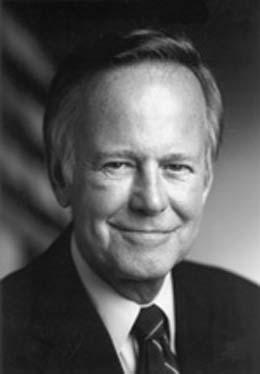Brock Adams represented Washington for 12 years in the U.S. House of Representatives and six in the U.S. Senate, and also served as the U.S. Secretary of Transportation in the Carter administration. He began his career as a lawyer in Seattle, and in 1961 he was appointed to the position of U.S. Attorney. In 1964 he was elected as a Democrat to the U.S. House of Representatives. In Congress he criticized the Vietnam War, became a key player in restructuring the nation's railroad system after Penn Central collapsed, and worked to support AIDS research. He served as Secretary of Transportation under President Jimmy Carter and won a Senate seat in 1986 by defeating Republican incumbent Slade Gorton. Adams's political career ended in 1993 after several women accused him of sexual misconduct. He died of Parkinson's Disease in 2004.
Top of His Class
Adams was born on January 13, 1927, in Atlanta. He attended public school in Portland, Oregon, and served in the U.S. Navy during World War II. He graduated in 1949 at the top of his class from the University of Washington, where he was student body president. Three years later he graduated from Harvard Law School and began practicing law in Seattle. In 1958, he ran unsuccessfully for King County Prosecuting Attorney. President John F. Kennedy (1917-1963) appointed Adams as the United States Attorney for the Western District of Washington in 1961, making Adams the youngest U.S. Attorney in the nation at the time.
In 1964, Adams was elected as a Democrat from Washington's 7th District to the U.S. House of Representatives and he served in Congress for the next 12 years, becoming chairman of the new House Budget Committee. He criticized the Vietnam War and was an early supporter of the presidential campaign of Sen. Robert F. Kennedy. Adams was credited with almost single-handedly restructuring the East Coast railroad system after the collapse of the Penn Central railroad. He also helped establish Amtrak, the national passenger rail carrier. He was regarded as "gifted, often brilliant" at politics and Speaker of the House Tom Foley called him the "Golden Boy" and "the young prince of politics" (The Seattle Times).
In 1977, President Jimmy Carter appointed Adams as the Secretary of Transportation. In 1979, Adams resigned from the Carter cabinet after policy conflicts with the president and his staff over airline deregulation. Adams practiced law in Washington, D.C., specializing in lobbying foreign governments on fishing rights. Although he maintained a home on Capitol Hill in Seattle, he spent most of his time in Washington, D.C., and he took almost no part in local political issues.
In 1986, Adams ran against Republican incumbent U.S. Senator Slade Gorton and won. Gorton had voted for cuts to Medicare and for limits on Social Security, and Adams accused Gorton of lacking clout with the Republican administration of President Ronald Reagan. Another issue was whether to restart a Hanford reactor for bomb-grade plutonium production at a time when "down-winders" were raising the issue of past nuclear contamination. Adams used the issue in TV ads to motivate his liberal Puget Sound base. He narrowly defeated Gorton. In that election, Democrats regained control of the Senate from Republicans. As a senator, Adams supported funding for AIDS research and was instrumental in obtaining $190 million for research after a Senate committee blocked the appropriation.
Allegations of Sexual Misconduct
In 1987, 26-year-old House aide Kari Tupper told police that Adams had drugged and molested her. Police in Washington, D.C., referred a criminal prosecution against Adams, but the Office of the United States Attorney declined prosecution, citing lack of physical evidence and terming Tupper's credibility as a witness "totally meritless" (The Seattle Times). But as Adams geared up to run for re-election in 1992, The Seattle Times published a story reporting allegations from additional women, none of whom were named but some of whom had signed or agreed to sign statements supporting the allegations, claiming that Adams had sexually harassed or molested them. Adams denied the allegations, but withdrew his candidacy for re-election; Senator Patty Murray (b. 1950) won the Senate seat in November 1992.
After his term ended in January 1993, Adams retired to his home in Stevensville, Maryland, making a public appearance before a Congressional committee with actor Michael J. Fox to talk about Parkinson's Disease. He died of Parkinson's at his home on September 10, 2004.

